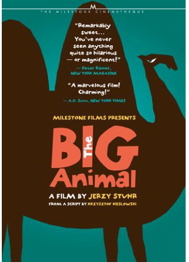| Release List | Reviews | Price Search | Shop | Newsletter | Forum | DVD Giveaways | Blu-Ray/ HD DVD | Advertise |
| Reviews & Columns |
|
Reviews DVD TV on DVD Blu-ray International DVDs Theatrical Reviews by Studio Video Games Features Collector Series DVDs Easter Egg Database Interviews DVD Talk TV DVD Talk Radio Feature Articles Columns Anime Talk DVD Savant HD Talk Horror DVDs Silent DVD
|
DVD Talk Forum |
|
|
| Resources |
|
DVD Price Search Customer Service #'s RCE Info Links |
|
Columns
|
 |
The Big Animal
|
||||
Every once in a while a film is made to carry on the work of a great director who has passed away. Steven Spielberg announced that he filmed Artificial Intelligence: A.I. to finish a pet project that Stanley Kubrick could not. The celebrated director Krzystof Kieslowksi died in Warsaw in 1996 leaving behind many scripts and film ideas; actor Jerzy Stuhr directed and starred in this 2000 parable from an un-filmed Kieslowski screenplay. The Big Animal strongly resembles an early Kieslowski film in both style and subject matter, especially in its dark satiric attitude. Though often billed as a charming comedy, the simple tale comments on society with what has been described as a characteristically Polish brand of pessimism.
The above synopsis doesn't describe a comedy, which means that despite its welcoming title The Big Animal is not a film for children. The pleasant little film has many scenes of mild amusement. Stuhr films the show in B&W with a texture that reminds of older Eastern European films, and give the film a disarmingly placid pace and tone. The malice in the picture comes from an unspoken social dynamic that says that a community can turn on one of its members for cruelly unjust reasons. The blame isn't placed on some autocratic authority or any particular political system, but on the nature of the community itself. Zygmundt and Marysia's camel is a conspicuous possession that makes them seem special and different, and it's almost immediately resented. False rumors are started about strange diseases the animal might carry. Although there are plenty of horses in town, the camel's droppings are singled out as a serious problem, even after he pays his 'horse tax.' Local firemen are upset because Zygmunt ignores hints to give them the camel for the town raffle. Zygmunt is summoned before a city council meeting to hear his irate neighbors level ridiculous charges at him. The Sawikis are bad-mouthed, harassed and shunned as behaving counter to the community interest, when in reality they simply refuse to indulge the community greed. Is Kieslowski saying that Poles are small-minded and vindictive? The movie may be a satire but nothing in it is exaggerated. It's like a low-key version of Ibsen's The Enemy of the People, except that these good citizens are willing to come to blows and commit cowardly acts of over the most petty of issues. In the middle is the camel, a decidedly odd symbol. He might represent a bourgeois luxury or possession, anything that an insecure, mean-spirited neighbor could interpret as ostentatious: "Look what I have that you don't." He also could be a new idea, something unfamiliar and suspicious. Being from far-off Arabia the camel is a foreigner; some picketers insinuate that his little barn with minarets is damaging to the local identity. But as most of the rancor centers around money, Mr. Camel most likely represents a social-economic inequity, a bragging point that makes the neighbors feel inadequate. The Sawicki's do no bragging; all they need do to attract hatred is be proud of their pet in public. A friend who visited a town in Western Ireland told me a story about a group of young men, most of which did not have steady jobs. One earned better school grades, won a decent job and eventually bought a car. His 'friends' got drunk and wrecked it just to take him down a notch. Forced equality may comment on Socialism in general -- if everyone can't have new cars, nobody should. The Big Animal has added appeal in that the camel is a living thing, doted on the way a person might indulge a pet dog. The Sawickis adore him. The campaign against them is sort of a quiet mass hysteria. The plot is so slight that it would be unfair to say more about what happens. The film ends not happily, but on a warm note. We particularly remember the camerawork of Pawel Edelman's camerawork in the last scene. The camels in the zoo are not as pretty as their beloved pet, but the Sawickis greet them like old friends. They're certainly better company than those human neighbors back home. Milestone and New Yorker's DVD of The Big Animal is a fine flat transfer of this short (72 min.) and affecting little gem from Poland. A short featurette contains material shot on the film set, but even better is a half-hour interview with actor/director Jerzy Stuhr. The immensely likeable Stuhr comments on his career in Poland and Italy, his collaborations with Krzystof Kiewslowski and even his home life, and never bores us. Milestone's disc includes an extensive press kit, and a video promo that is not very good. The Big Animal is a difficult sell, yet lingers in the memory ... and it's bound to have an even stronger effect on those who love animals.
On a scale of Excellent, Good, Fair, and Poor,
The Big Animal rates:
Review Staff | About DVD Talk | Newsletter Subscribe | Join DVD Talk Forum |
|
| Release List | Reviews | Price Search | Shop | SUBSCRIBE | Forum | DVD Giveaways | Blu-Ray/ HD DVD | Advertise |






